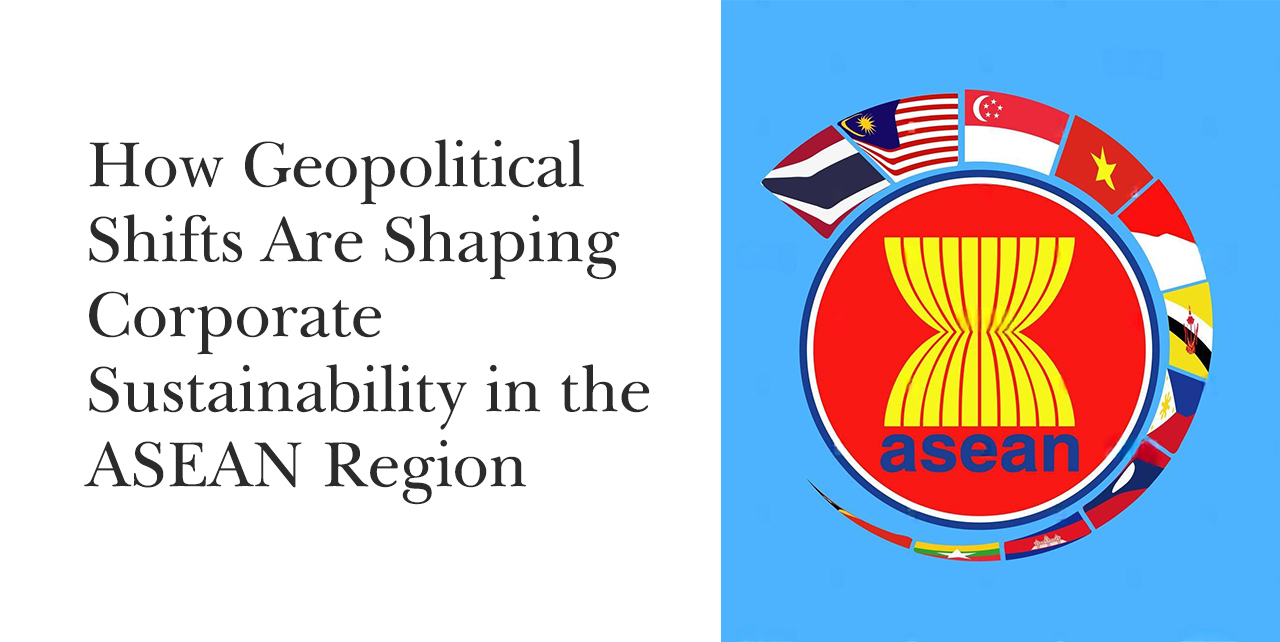Geopolitics refers to the influence of geographic, economic, and political factors on international relations. In the ASEAN context, understanding geopolitics is crucial as it directly impacts Environmental, Social, and Governance (ESG) practices within the corporate sector.
ASEAN businesses must adapt to these global shifts to remain competitive. Integrating ESG considerations is no longer optional but a strategic necessity in the evolving global market.
Global Policies Reshaping ASEAN’s ESG Landscape
Evolving geopolitical landscapes, such as trade tensions and policy shifts, have allowed ASEAN countries to lead in sustainability. For instance, changes in Western environmental policies have opened the way for Asia to assert dominance in ESG matters, encouraging ASEAN corporations to adopt more robust sustainability frameworks.
Global Policies Reshaping ASEAN’s ESG Landscape
Major global economies, particularly the European Union (EU), the United States, and China, are setting stringent ESG policies that affect trade, investment, and corporate operations in ASEAN.
EU’s Carbon Border Adjustment Mechanism (CBAM)
The CBAM is a regulation designed to impose carbon tariffs on imported goods based on their carbon footprint. This policy directly impacts ASEAN exporters in the steel, cement, aluminum, and energy industries. Companies that fail to comply with carbon reduction standards may face restricted access to the EU market.
European Union Deforestation Regulation
The regulation mandates that commodities like palm oil, soy, rubber, and timber imported into the EU must not be linked to deforestation. This poses challenges for ASEAN exporters, particularly from Indonesia and Malaysia, who must enhance supply chain transparency to maintain access to European markets.
Regional Comprehensive Economic Partnership
RCEP is a free trade agreement among 15 Asia-Pacific countries, including all ASEAN members. While it aims to reduce tariffs and boost trade, the agreement has been critiqued for lacking commitments to labor rights and environmental standards, potentially impacting corporate sustainability efforts within the region.
Advancements in Sustainability Related Finance - Taxonomy for Sustainable Finance
Asian nations, including those in ASEAN, are progressing in developing green finance taxonomies and disclosure rules. These initiatives aim to standardise sustainable finance practices, facilitating investments in environmentally friendly projects and promoting corporate sustainability.
Supply Chain Realignments and ESG Expectations
Geopolitical tensions, such as the U.S.-China trade war, have led to a major realignment of global supply chains, with many companies moving operations to ASEAN. This trend, known as “friendshoring,” increases expectations for ESG compliance.
Tech and Semiconductor Industry Shifts
With the U.S. restricting China’s access to semiconductor technology, chip manufacturers are expanding into ASEAN countries like Malaysia and Vietnam. This shift presents an opportunity for these nations to lead in sustainable tech manufacturing.
The Role of Investment and Sustainable Development
Geopolitical influences have also shaped green finance and sustainable infrastructure development in ASEAN. Governments and private companies are increasingly prioritising ESG-aligned investments to remain globally competitive.
Green Investment and International Funding
Global financial institutions, including the World Bank and Asian Development Bank (ADB), are channeling funds into renewable energy, sustainable urban development, and ESG-compliant businesses in ASEAN. Companies that align with these sustainability trends can secure long-term funding and investment opportunities.
The Competitive Advantage of ESG Readiness
By making ESG a strategic priority, ASEAN businesses can survive and thrive in an increasingly complex global landscape. The question is no longer whether companies should integrate sustainability but how quickly they can adapt to seize new opportunities. ASEAN’s commitment to ESG will ultimately define its role in the global economy.
ASEAN businesses are increasingly integrating ESG to stay competitive in the global market. Geopolitical support has driven investments in green infrastructure, aligning the region with sustainability standards.
Avoiding ESG poses risks—trade restrictions, investment losses, and reputational damage. However, ASEAN has the potential to lead in sustainable development, leveraging its resources, green finance growth, and government support.
By prioritizing ESG, companies can turn challenges into opportunities, ensuring resilience and long-term success in the evolving global economy. Sustainability is no longer optional—it’s a competitive necessity.


